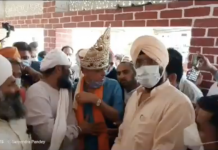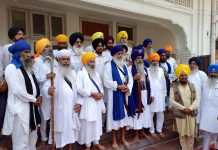


“Operation Bluestar began with the forced eviction of all foreign journalists from Punjab. This, coupled with a state-wide curfew enforced by soldiers, limited the documentation of the civilian experience. However, the people’s memory of these events has been preserved successfully.” [Mallika Kaur: Ten Thousand Pairs of Shoes]
A lot of planning went into this year’s 1984 Remembrance March and Rally. People may brand the June 84 Rallies and Marches as “melas” or “family outings”, but those people seem to forget that we have a moral obligation to pass on the legacies of Shaheeds (martyrs) to the successive generation. This may be in the form of slogans and speeches, but they are not going to waste. If they were, then we wouldn’t be here 30 years commemorating 1984 despite all attempts that the elites of India made to demonize and cover up the attack. The purpose of the recitation of the graphic torture of Shaheeds in our daily Ardaas (prayer) and Shaheedi Jor melas (commemoration rallies) is to ensure we are sustaining the legacy in our minds.
I was in a radio interview at BBC London 94.9 yesterday and one thing journalist Chris Rogers commented on air was how some of the children of Sikhs he had met were so fluent in the Sikh narrative around 1984. He mentioned he was in Gurdwara where he saw pictures drawn by Sikh children about 1984. The point I am trying to make is that remembrance is a preservation of our history, without a preservation of the history there is no acknowledgement and no chance of taking things forward.
There’s a famous quote from Thomas Jefferson: “Educate and inform the whole mass of the people… They are the only sure reliance for the preservation of our liberty.”
I am not saying that what is currently being done around Truth, Justice and Freedom is sufficient. We are snail pacing our way through dealing with issues.
However, I do now challenge those who believe better strategies exist to really stand up and become leaders. To occupy the spaces of leadership, by taking over and committing to those roles.
It’s easy to be an expert, an expert knows all the answers…if you ask the right questions! But to be a practitioner does not seem so desirable and this is where we see the lack in quality. I have been hovering around Panthik circles for 10 years now and I may still be a novice, but one thing I have observed is the fear or lack of willingness to commit to Panthik projects in many Sikhs of my generation. That coupled with suspicions and jathebhandi (various organizations) paranoia means that very few Sikhs are actually in positions of clout. If there is to be any change then a collective of like-minded influential Sikhs need to harmonize, commit, focus and drive the change.
We need to move from a culture of experts to practitioners…




